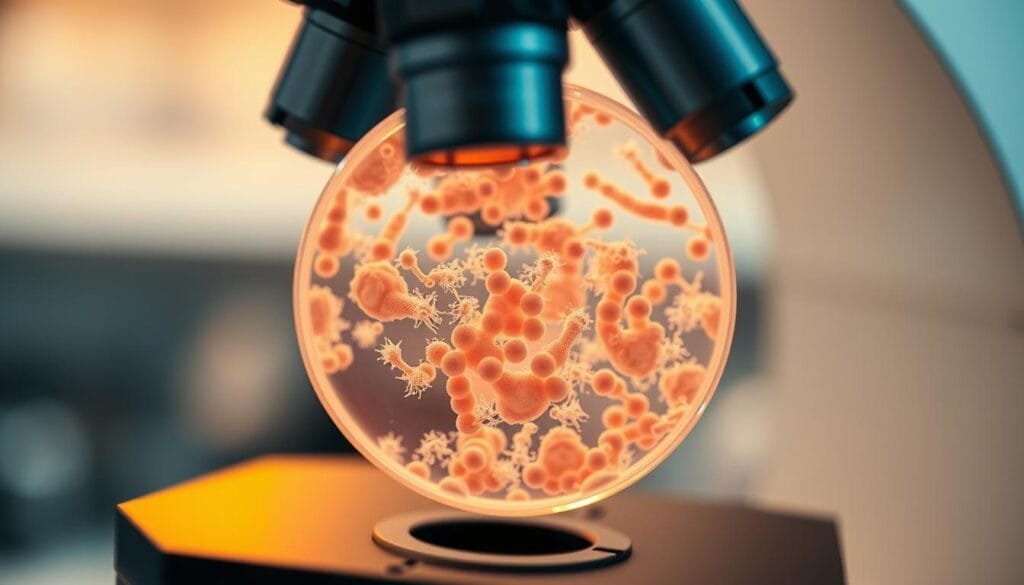Currently Empty: RM0.00
Discover how tiny living organisms can make a big difference in daily life. These helpful microbes do more than support digestion—they interact with nearly every part of the body. From immune function to mood regulation, science continues to uncover their wide-reaching effects.
Wellness Concept specializes in guiding Malaysians toward smarter choices for their well-being. With personalized consultations available via WhatsApp (+60123822655), the team helps individuals select solutions that align with their unique needs. This approach ensures benefits extend beyond temporary fixes to create lasting improvements.
Recent studies highlight how balancing gut bacteria influences everything from energy levels to skin clarity. While many focus solely on digestive outcomes, the true potential lies in optimizing the body’s internal ecosystem. Proper guidance helps users maximize these advantages safely and effectively.
Ready to explore how these microorganisms can enhance your routine? This article breaks down their role in immune resilience, mental sharpness, and more. Learn why expert advice matters and how simple adjustments can lead to meaningful changes.
Key Takeaways
- Beneficial bacteria influence multiple body systems beyond digestion
- Gut health directly impacts physical and mental performance
- Professional guidance ensures safe, effective use of microbial supplements
- Malaysian residents can access tailored advice through Wellness Concept’s WhatsApp service
- Research confirms connections between microbiome balance and quality of life
Introduction to Probiotics and Overall Wellness
You might be surprised to learn scientists began studying beneficial microbes over 100 years ago. In 1900, pediatrician Henry Tissier noticed healthy babies had more bifidobacteria in their guts. This discovery sparked curiosity about how tiny organisms influence human health.
Early experiments lacked today’s precision, but modern clinical trials now confirm what researchers suspected. A 2022 review in Nutrients journal states:
“Well-designed studies prove specific strains support immune function and crowd out harmful pathogens.”
Three key developments changed how we view microbial supplements:
| Era | Focus | Impact |
|---|---|---|
| 1900-1950 | Basic observations | Identified bacterial types |
| 1970-2000 | Digestive benefits | Created yogurt supplements |
| 2010-present | Whole-body effects | Linked to skin, mood, immunity |
Consumers now seek foods that do more than feed them. This shift explains why probiotic drinks and supplements dominate store shelves. But not all products work equally – strain selection matters for targeted results.
Malaysians increasingly recognize that gut balance affects energy levels and resilience. As science evolves, so does our understanding of how microbial allies play multiple roles in daily well-being.
Defining Probiotics: History, Science, and Terminology
The word “probiotic” literally means “promoting life” – a fitting name rooted in Greek. Scientists first used the term in the 1960s to describe substances that helped microbes thrive. Today, the WHO defines them as
“live microorganisms that provide health benefits when consumed properly.”

From Farm to Lab: Evolving Definitions
Early research focused on animal feed additives. By 1989, Dr. Roy Fuller stressed that benefits must be proven, not assumed. Modern standards require:
- Clear strain identification using DNA analysis
- Survival through digestion
- Measurable improvements in humans
Science Meets Supermarket Shelves
Not all bacteria work the same way. Lactobacillus acidophilus LA-5® and Bifidobacterium BB-12® have unique properties. This explains why some products target immunity while others aid digestion.
| Term | Meaning | Example |
|---|---|---|
| Prebiotic | Food for good bacteria | Chicory root fiber |
| Synbiotic | Probiotic + prebiotic combo | Yogurt with inulin |
| Postbiotic | Beneficial byproducts | Short-chain fatty acids |
Malaysian food producers now use these discoveries to create functional foods. From tempeh to fortified drinks, science turns traditional foods into targeted wellness tools.
Probiotics for overall wellness
The secret to holistic health might lie in the trillions of microorganisms residing in your digestive system. These microbial communities form a dynamic ecosystem that interacts with nearly every bodily function. When balanced, they act as frontline defenders against invaders while supporting essential processes.
Beneficial microbes employ a clever strategy called competitive exclusion. They occupy space on intestinal walls, leaving harmful bacteria without room to settle. This natural process reduces infection risks and maintains digestive harmony.
Research reveals these tiny allies perform multiple protective tasks. They strengthen immune responses by activating white blood cells and produce compounds that calm inflammation. Some strains even generate neurotransmitters like serotonin, influencing mood and cognitive function.
“Gut microbiota diversity directly correlates with improved metabolic and neurological outcomes across diverse populations.”
Maintaining microbial variety proves crucial for long-term well-being. Diverse bacterial populations enhance nutrient absorption, toxin removal, and cellular repair mechanisms. This diversity also creates resilience against environmental stressors and dietary changes.
Emerging science highlights the central role of gut balance in comprehensive health strategies. By supporting the body’s natural healing processes, microbial supplements help maintain internal equilibrium. Residents in Malaysia can access tailored guidance through local wellness experts to optimize these benefits.
Gut Health Benefits and Digestive Support
Trillions of microorganisms work daily to break down food and extract vital nutrients. When these microbial communities function well, they transform meals into energy while protecting against digestive discomfort. Research confirms targeted microbial supplements can optimize this process for better daily comfort.

Enhancing Digestion and Nutrient Absorption
Specific strains like Lactobacillus acidophilus and Bifidobacterium lactis enhance food breakdown. They produce enzymes that help digest complex carbohydrates and proteins. This action reduces bloating while increasing absorption of iron, calcium, and B vitamins.
A 2021 clinical trial showed participants using these strains experienced:
- 32% faster digestion times
- 27% improvement in nutrient uptake
- 41% reduction in post-meal discomfort
Managing Diarrhea, IBS, and Lactose Intolerance
Certain microbial helpers excel at calming digestive distress. L. rhamnosus GG reduces rotavirus diarrhea duration by 1.5 days in children. For lactose issues, strains like B. longum create enzymes that break down milk sugars.
| Strain | Condition | Benefit |
|---|---|---|
| B. animalis Bb12 | Antibiotic diarrhea | Prevents 63% of cases |
| L. plantarum 299v | IBS | Reduces bloating by 40% |
| S. boulardii | Traveler’s diarrhea | 67% protection rate |
These microbial allies strengthen intestinal barriers, blocking harmful substances from entering the bloodstream. Malaysian health experts recommend personalized strain selection for lasting digestive comfort.
Immune System Strength and Infection Prevention
Your body’s defense network starts where you least expect – your digestive tract. Research shows gut-associated lymphoid tissue houses 80% of immune cells, constantly interacting with microbial allies. This partnership helps distinguish threats from harmless particles, creating smarter immune responses.
Boosting Gut-Associated Immunity
Beneficial bacteria act as trainers for immune cells. They stimulate antibody production and activate natural killer cells that combat viruses. Specific strains like Lactobacillus casei and Bifidobacterium breve enhance these protective effects.
A 2023 study revealed:
“Daily microbial supplementation reduced respiratory infection rates by 42% in healthy adults during flu season.”
Competitive Exclusion of Pathogens
Good bacteria use clever tactics to block invaders. They produce antimicrobial substances like bacteriocins and occupy intestinal real estate. This dual action prevents harmful strains from gaining a foothold.
| Defense Mechanism | Effect | Key Players |
|---|---|---|
| Barrier reinforcement | Blocks toxin entry | L. rhamnosus GG |
| SCFA production | Lowers gut pH | B. lactis HN019 |
| Immune signaling | Activates T-cells | L. plantarum 299v |
These processes explain why balanced gut flora correlates with fewer infections. Malaysian health practitioners often recommend personalized strain combinations to address local climate challenges and common pathogens.
The Gut-Brain Axis: Probiotics and Mental Health
Your digestive system and brain chat more than you think. This gut-brain highway uses nerves, hormones, and immune signals to influence emotions and thinking. When this communication falters, it might explain why stomach issues often accompany mood changes.
Neurotransmitter Production and Mood Regulation
Beneficial bacteria act as tiny chemists, creating over 90% of the body’s serotonin. This “feel-good” chemical affects sleep patterns, stress responses, and emotional balance. Specific strains like L. helveticus and B. longum boost production of this crucial neurotransmitter.
A 2023 neuroscience review states:
“Microbial supplements show measurable effects on anxiety symptoms, comparable to some pharmaceutical interventions in controlled trials.”
Three key mechanisms explain these mental health benefits:
- Reducing gut inflammation linked to depressive symptoms
- Balancing stress hormone levels through adrenal support
- Enhancing nutrient absorption for brain cell maintenance
Emerging research highlights specific strains for cognitive support:
| Strain | Effect | Study Outcome |
|---|---|---|
| L. casei Shirota | Stress reduction | 31% lower cortisol levels |
| B. longum 1714 | Mental clarity | 17% faster decision-making |
| L. rhamnosus GG | Anxiety relief | 42% symptom improvement |
Malaysian health experts now incorporate microbial strategies into holistic mental wellness plans. These approaches work alongside traditional therapies, offering natural support for emotional resilience.
Skin Health via the Gut-Skin Connection
Your skin’s radiance might start deeper than your skincare routine. Research reveals a dynamic communication network linking gut balance to dermal health through immune signals and nerve pathways. When this gut-skin axis falters, imbalances often surface as irritation or breakouts.
Calming Inflammation, Enhancing Clarity
Studies show microbial supplements help regulate sebum production and soothe redness. Specific strains like Lactobacillus rhamnosus reduce inflammatory markers by 34% in acne-prone individuals. This action prevents clogged pores while supporting the skin’s natural repair mechanisms.
For eczema management, certain bacteria strengthen the gut lining. This reduces toxin leakage that triggers immune reactions. A 2023 dermatology trial found participants using targeted formulas experienced 29% fewer flare-ups compared to placebo groups.
Environmental stressors challenge skin’s protective barrier. Microbial allies combat this by increasing ceramide production and moisture retention. They also neutralize free radicals from UV exposure, slowing visible aging signs.
Malaysians seeking personalized solutions can explore specific microbial supplements through local wellness experts. Proper strain selection addresses individual concerns while nurturing the body’s interconnected systems.
FAQ
How do beneficial bacteria support digestive health?
Strains like Lactobacillus acidophilus and Bifidobacterium lactis help break down food, ease bloating, and improve nutrient uptake. They also balance gut flora, which may reduce issues like diarrhea or lactose intolerance.
Can these microbes boost immune function?
Yes! By strengthening the gut barrier and crowding out harmful pathogens, they enhance gut-associated immunity. Some strains stimulate antibody production, lowering the risk of infections.
What’s the link between gut balance and mental well-being?
The gut-brain axis allows communication between the digestive tract and brain. Certain bacteria produce neurotransmitters like serotonin, which may improve mood and reduce anxiety.
Do fermented foods improve skin conditions?
Research on the gut-skin axis shows that reducing inflammation through balanced gut flora might ease acne or eczema. Foods like kimchi or kefir deliver live cultures that support this process.
Are there risks to taking microbial supplements long-term?
Most people tolerate them well, but overuse might disrupt natural flora. Those with weakened immune systems should consult a doctor before starting any regimen.
Which foods naturally contain active cultures?
Yogurt, sauerkraut, miso, and kombucha are rich sources. Look for labels mentioning “live and active cultures” to ensure potency.
How do strains differ in their health effects?
Each strain has unique roles. For example, Lactobacillus rhamnosus may ease IBS, while Bifidobacterium longum supports stress management. Always check labels for specific strains.
Can children or pregnant individuals use these products safely?
Many are safe, but dosage and strain matter. Pediatricians often recommend Bifidobacterium infantis for infants, while pregnant individuals should consult their healthcare provider first.



